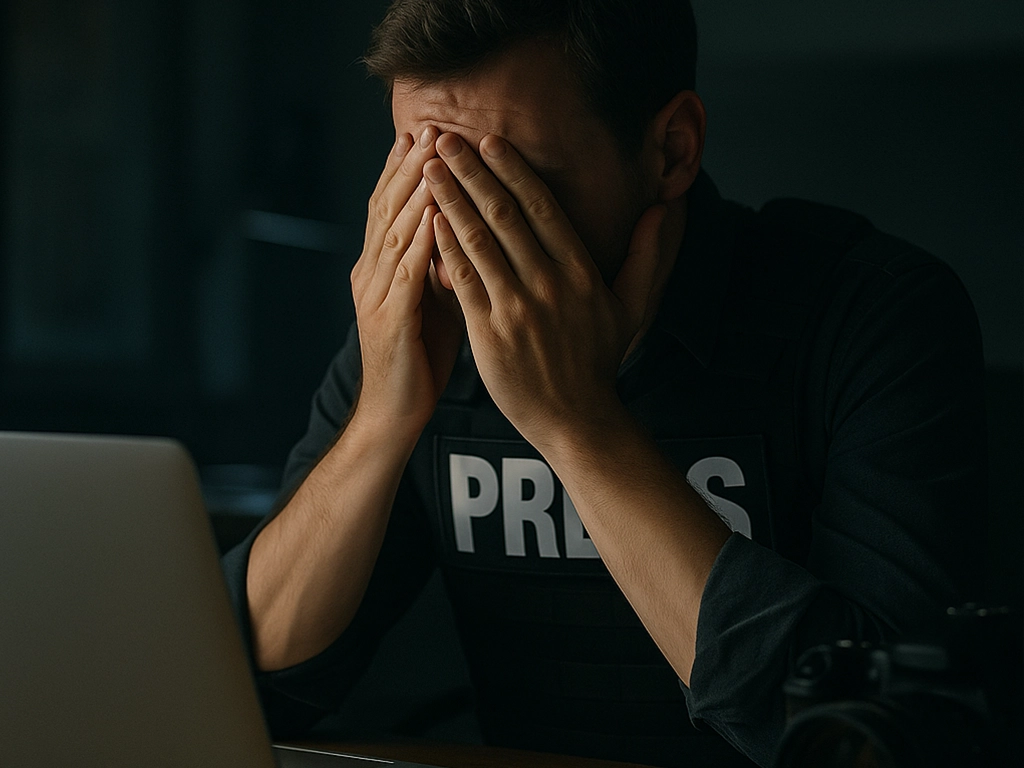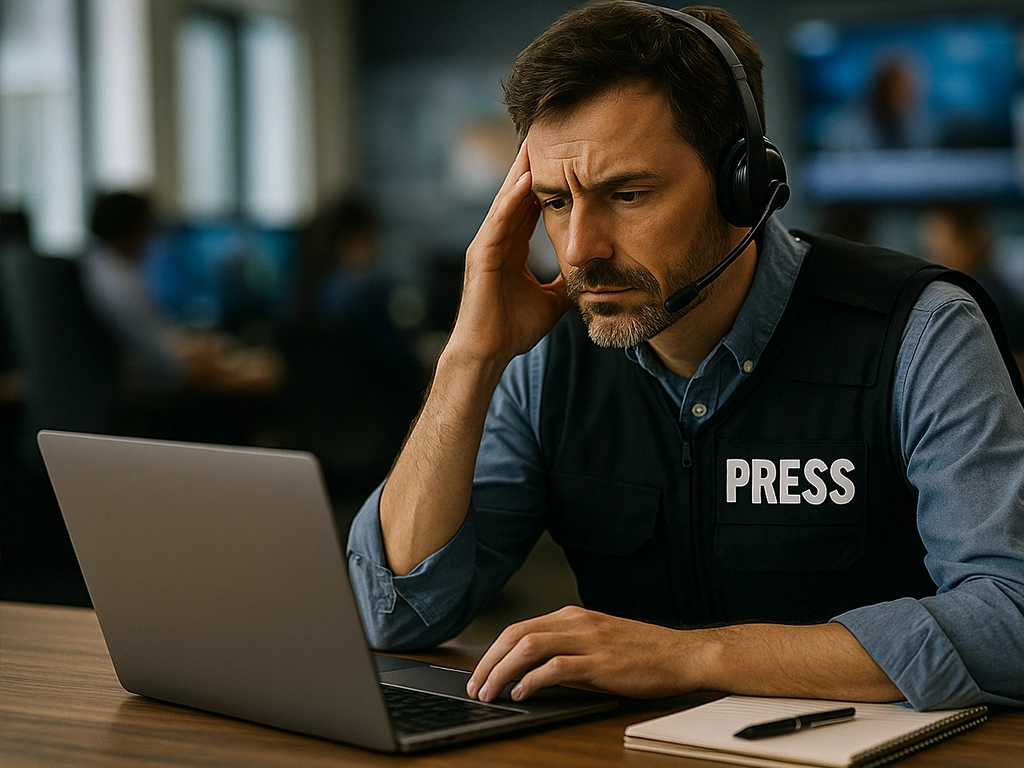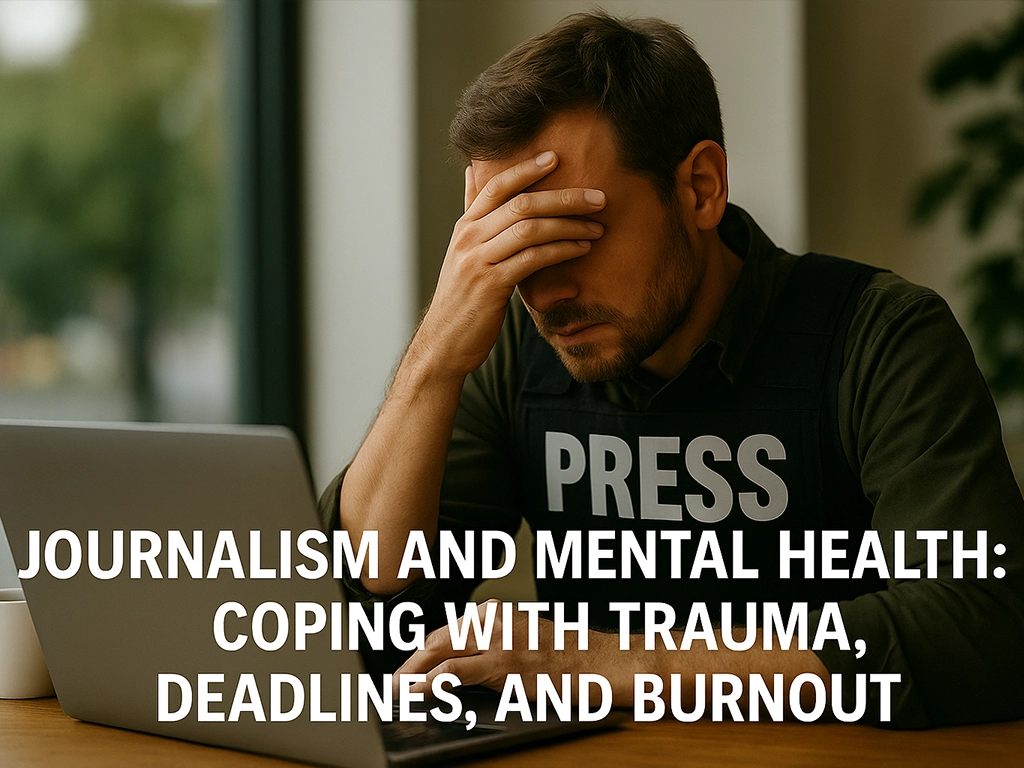Introduction
In today’s fast-paced, crisis-driven world, journalists often find themselves on the frontlines of tragedy, injustice, and conflict. While they are responsible for documenting reality and informing the public, the emotional toll of this work can be heavy. From covering wars, disasters, and human suffering to working under relentless deadlines and job insecurity, the mental health of media professionals is increasingly at risk. This article explores the unique psychological challenges faced by journalists and presents strategies for coping, recovery, and systemic change—supported by initiatives like those from the United States Press Agency (USPA).
The Hidden Toll of Reporting
Journalists are trained to be observers, not participants. Yet exposure to trauma can leave lasting effects—especially when covering war zones, natural disasters, or violent crimes. Witnessing suffering, listening to traumatic stories, and confronting ethical dilemmas can trigger symptoms akin to PTSD. In fact, several studies show that rates of depression, anxiety, and substance use are higher among journalists than in many other professions.
Beyond frontline trauma, daily exposure to distressing news, such as political unrest, climate disasters, or social injustices, can accumulate and result in chronic stress or emotional numbness. Digital journalists and social media editors are particularly vulnerable due to constant exposure to graphic user-generated content.

Burnout and Deadline Pressure
In addition to trauma, journalists contend with extended work hours, irregular schedules, reductions in newsroom staff, and the expectation of constant availability. The industry’s competitive environment and the accelerated tempo of online news cycles often contribute to overwork and fatigue. Burnout—a condition characterised by emotional, physical, and mental exhaustion stemming from prolonged stress—is increasingly prevalent among media professionals.
The imperative to secure exclusive stories, achieve viral reach, or obtain funding may further heighten feelings of isolation, particularly among freelancers or those in less stable roles. This ongoing pressure can result in individuals disregarding early indicators of distress, which may subsequently develop into more significant mental health concerns if left unaddressed.
Stigma and Silence in the Industry
Despite the widespread occurrence of mental health challenges, journalistic culture frequently associates vulnerability with weakness. Many reporters are apprehensive that acknowledging experiences of anxiety, depression, or trauma could be construed as a lack of professionalism. The prevailing emphasis on resilience, objectivity, and detachment often discourages individuals from seeking assistance.
Consequently, many journalists experience these challenges in isolation. Newsrooms seldom offer robust mental health resources, and freelancers typically lack institutional support. This pervasive silence allows such issues to remain unrecognised until they escalate into critical situations.

Strategies for Coping and Support
Journalists and their employers must actively prioritize mental health—not just in crisis situations, but as part of everyday newsroom culture. Below is a more detailed set of practical, supportive strategies to help journalists develop resilience, manage stress, and access help when needed:
- Trauma-Informed Training and Mental Health Literacy
Newsrooms and press organizations should offer regular training on mental health, trauma exposure, and emotional regulation. These sessions should teach:
- How to recognize signs of burnout, PTSD, and compassion fatigue
- What to do immediately after witnessing traumatic events
- How to safely process emotionally intense interviews or imagery
- How to talk about mental health without fear or stigma
Tip: Freelancers can access trauma courses via organizations like Dart Center for Journalism & Trauma or free USPA webinars.
- Peer Support and Buddy Systems
Sharing experiences reduces emotional isolation. Journalists benefit from structured peer-to-peer support, such as:
- Confidential discussion groups (digital or in-person)
- Rotating “buddy check-ins” within editorial teams
- Anonymous helplines for peer support
- Mentoring relationships between seasoned and younger journalists
Tip: USPA members can join moderated mental health circles and connect with trained peer listeners.
- Professional Help and Counseling Access
Journalists who regularly cover distressing topics need accessible, judgment-free psychological care. Helpful structures include:
- Access to trauma counselors or psychologists after major assignments
- Emergency debriefing sessions for teams covering disasters or conflict
- Discounts for freelancers on licensed mental health platforms (e.g. BetterHelp, OpenUp)
- Dedicated mental health contact points within press organizations
Tip: USPA provides referrals to certified therapists familiar with journalism-related trauma.
- Healthy Boundaries and Work-Life Balance
In always-on digital environments, intentional detachment is essential. Healthy habits include:
- Turning off alerts after work hours
- Creating “no-news” time blocks daily
- Using separate devices for work and personal use
- Agreeing to off-duty time after intense field work
Tip: USPA encourages editors to help staff create flexible recovery schedules after emotionally taxing assignments.
- Resilience and Self-Care Rituals
Small daily practices help build long-term mental resilience. Encourage:
- Mindful breathing or meditation apps (like Headspace or Calm)
- Daily gratitude journaling
- Regular, non-screen time walks or nature breaks
- Meal prep, hydration, and sleep routines—especially during deadline stress
- A “go-to” kit of personal coping tools (music, stretching, creative hobbies, etc.)
Tip: USPA’s wellness guide includes templates for self-care plans and emotional emergency checklists.
- Mental Health Agreements and Recovery Plans
Newsrooms should treat mental well-being like physical safety. Suggestions:
- Let reporters build personal “mental health protocols” (who to call, what calms them, how to signal burnout)
- Allow debrief sessions after tough stories—even short ones
- Build a culture where checking in with each other is normalized
Tip: USPA encourages members to prepare a simple “mental health first aid” plan, including support contacts and early-warning signs.
These strategies aren’t about avoiding hardship—they’re about creating structures of care that allow journalists to do meaningful work without sacrificing themselves. When the press is protected mentally, their storytelling becomes sharper, more empathetic, and more sustainable.

The Role of USPA in Advancing Mental Health Initiatives
The United States Press Agency (USPA) acknowledges the emotional and psychological challenges inherent to journalistic work. To address these issues, USPA advances mental health awareness through:
- Providing educational resources and webinars
- Collaborating with mental health professionals
- Advocating for supportive policies
- Fostering peer support and community engagement
Cultivating a Healthier Journalism Environment
Effectively addressing mental health within journalism necessitates cultural transformation. It is imperative that media leaders exemplify transparency and promote normalization of mental health support. Introducing mental health days, regular well-being check-ins, and revising human resources policies are essential steps.
As journalism continues to evolve, emotional resilience proves to be as critical as technical reporting abilities. Supporting mental well-being is not an optional benefit but a professional requirement.

Conclusion: Prioritizing the Well-Being of Journalists
Journalists play an indispensable role in upholding democracy and public trust. Safeguarding their mental health is both an ethical obligation and a crucial component of effective reporting. By implementing protective measures, organizations ensure that the pursuit of truth does not compromise individual well-being. The USPA exemplifies leadership in this area by cultivating an environment where seeking assistance is encouraged, and strength encompasses acknowledging vulnerability.
